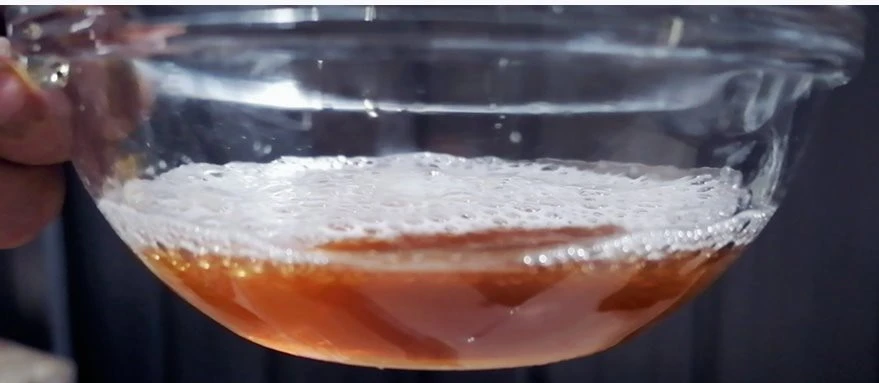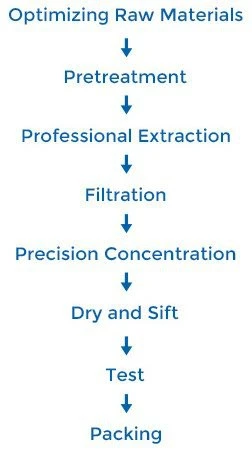Extract of Quillaia: The Sustainable Choice for Food and Drinks
In today's rapidly evolving food and beverage industry, manufacturers are increasingly seeking natural, sustainable alternatives to synthetic additives. Extract of quillaia emerges as a revolutionary solution, offering unparalleled functionality while addressing growing consumer demands for clean-label products. This natural extract, derived from the bark of the Chilean soapbark tree (Quillaja saponaria), represents the perfect intersection of sustainability, functionality, and consumer health consciousness. As environmental awareness continues to shape purchasing decisions, extract of quillaia stands as a testament to how nature provides superior alternatives to synthetic chemicals, delivering exceptional performance in food and beverage applications while maintaining the highest standards of safety and sustainability.

Why Extract of Quillaia Revolutionizes Modern Food Processing?
The transformation of the food processing industry toward natural ingredients has created unprecedented opportunities for innovative manufacturers. Extract of quillaia represents this paradigm shift perfectly, offering a comprehensive solution that addresses multiple industry challenges simultaneously. This natural extract delivers exceptional functionality while meeting the stringent requirements of modern food safety standards and consumer expectations.
Superior Emulsification Properties Transform Product Quality
Modern food manufacturers face the constant challenge of creating stable, appealing products that maintain their quality throughout extended shelf life. Extract of quillaia addresses this challenge through its remarkable emulsification properties, enabling the seamless integration of oil and water-based components in various food formulations. The saponins present in soapbark extract powder create stable emulsions that surpass many synthetic alternatives in both performance and consumer acceptance. This natural emulsifier maintains consistency across temperature variations and extended storage periods, ensuring products meet quality standards from production to consumption. The extract's unique molecular structure allows for superior binding of diverse ingredients, creating homogeneous mixtures that enhance both texture and flavor delivery. Food manufacturers utilizing extract of quillaia report significant improvements in product stability, reduced separation issues, and enhanced consumer satisfaction. The natural origin of this extract aligns perfectly with clean-label initiatives while delivering the technical performance required for commercial food production.
Natural Foaming Agent Excellence in Beverage Applications
The beverage industry has long relied on synthetic foaming agents to create the appealing texture and mouthfeel consumers expect in carbonated drinks, cocktail mixers, and specialty beverages. Extract of quillaia offers a natural alternative that not only matches but often exceeds the performance of synthetic counterparts. Soapbark extract powder contains high concentrations of saponins that produce stable, long-lasting foam when incorporated into beverage formulations. This natural foaming action enhances the sensory experience of beverages while providing manufacturers with a clean-label ingredient that resonates with health-conscious consumers. The extract's ability to maintain foam stability across varying pH levels and temperatures makes it ideal for diverse beverage applications, from root beer and cream soda to craft cocktails and functional drinks. Beverage manufacturers appreciate the extract's compatibility with other natural ingredients and its ability to enhance flavor perception through improved texture delivery. The sustainable sourcing of extract of quillaia ensures consistent supply while supporting environmentally responsible manufacturing practices.
Clean Label Compliance Drives Market Leadership
Consumer demand for transparency and natural ingredients has fundamentally transformed food labeling requirements and marketing strategies. Extract of quillaia provides manufacturers with a powerful tool to achieve clean-label compliance without compromising product performance or consumer appeal. This natural extract eliminates the need for multiple synthetic additives, simplifying ingredient lists while maintaining superior functionality. The plant-based origin of soapbark extract powder appeals to diverse consumer segments, including vegans, vegetarians, and those following specific dietary restrictions. Food manufacturers utilizing extract of quillaia can confidently market their products as natural, organic, and environmentally responsible, creating competitive advantages in increasingly crowded markets. The extract's versatility allows for standardized formulations across product lines, reducing complexity while ensuring consistent quality and performance. Manufacturing facilities can streamline operations by utilizing this single natural ingredient to replace multiple synthetic additives, improving efficiency while meeting consumer expectations for natural, wholesome products.
Environmental Impact and Sustainability Benefits
The environmental advantages of extract of quillaia extend far beyond its natural origin, encompassing the entire lifecycle from cultivation through manufacturing and end-use applications. This comprehensive sustainability profile positions the extract as a preferred choice for environmentally conscious manufacturers and consumers alike.
Renewable Resource Harvesting Supports Ecosystem Health
The Quillaja saponaria tree, native to Chile and Peru, represents a remarkable example of sustainable resource utilization that supports both environmental conservation and economic development. These hardy trees thrive in their natural habitat without requiring intensive agricultural inputs, pesticides, or excessive water resources. The bark harvesting process, when conducted responsibly, does not damage the trees, allowing for continued growth and multiple harvests over the tree's lifespan. Extract of quillaia production supports local communities while preserving natural ecosystems and biodiversity. The sustainable harvesting practices employed in collecting bark for soapbark extract powder contribute to forest conservation efforts and provide economic incentives for maintaining natural habitats. This renewable resource model demonstrates how commercial extraction can coexist with environmental protection, creating value for stakeholders while preserving natural resources for future generations. The minimal processing requirements for producing high-quality extract of quillaia reduce energy consumption and environmental impact compared to synthetic alternative production methods.
Carbon Footprint Reduction Through Natural Processing
The production of extract of quillaia involves significantly lower energy requirements and reduced carbon emissions compared to synthetic foaming and emulsifying agents. Traditional chemical synthesis processes require high temperatures, pressure systems, and multiple purification stages that consume substantial energy resources. In contrast, the extraction of saponins from soapbark bark utilizes environmentally friendly solvents and gentle processing techniques that minimize energy consumption while maintaining product purity and potency. Manufacturing facilities producing extract of quillaia can achieve substantial reductions in their carbon footprint through optimized extraction processes and renewable energy utilization. The natural processing methods eliminate the need for harsh chemicals and reduce waste generation, creating cleaner production environments that benefit both workers and surrounding communities. The concentrated nature of extract of quillaia means smaller quantities are required to achieve desired functionality, reducing transportation requirements and packaging materials throughout the supply chain. These environmental benefits translate into tangible cost savings for manufacturers while supporting corporate sustainability initiatives and environmental responsibility goals.
Biodegradability Advantages for Environmental Protection
One of the most significant environmental advantages of extract of quillaia lies in its complete biodegradability and lack of environmental persistence. Unlike synthetic additives that can accumulate in ecosystems and potentially disrupt natural processes, soapbark extract powder breaks down naturally without leaving harmful residues. This biodegradability extends to all stages of the product lifecycle, from manufacturing waste streams to end-consumer disposal. Food and beverage products containing extract of quillaia contribute to reduced environmental impact through natural decomposition processes that support rather than disrupt ecological systems. The absence of synthetic chemicals in extract of quillaia formulations eliminates concerns about bioaccumulation and long-term environmental contamination. Wastewater treatment facilities process effluents containing natural quillaia extracts more efficiently than those with synthetic additives, reducing treatment costs and improving water quality outcomes. The environmental safety profile of extract of quillaia makes it suitable for organic certification programs and environmentally sensitive applications where synthetic alternatives would be prohibited or discouraged.

Market Applications and Industry Integration
The versatility of extract of quillaia has driven its adoption across multiple industries, with food and beverage applications leading the growth in demand for this natural ingredient. Understanding the diverse applications and integration possibilities helps manufacturers optimize their product development strategies while maximizing the benefits of this sustainable extract.
Beverage Industry Innovation and Consumer Preferences
The beverage industry represents the largest market segment for extract of quillaia, driven by consumer preferences for natural ingredients and clean-label products. Carbonated soft drinks, including root beer, cream soda, and ginger beer, have traditionally relied on quillaia extracts for their characteristic foam and mouthfeel. Modern beverage manufacturers are expanding these applications to include craft sodas, functional beverages, and premium cocktail mixers that leverage the natural foaming properties of soapbark extract powder. The extract's ability to create stable foam enhances the sensory experience of beverages while supporting marketing claims about natural ingredients and sustainable sourcing. Alcoholic beverage producers utilize extract of quillaia in low-alcohol beers and specialty cocktails where natural foaming agents are preferred over synthetic alternatives. The extract's compatibility with other natural flavoring agents and preservation systems makes it ideal for innovative beverage formulations targeting health-conscious consumers. Quality control advantages include consistent performance across production batches and extended shelf stability that meets commercial distribution requirements.
Food Manufacturing Applications and Technical Performance
Food manufacturers have discovered numerous applications for extract of quillaia beyond traditional beverage uses, incorporating this versatile ingredient into baked goods, confectionery products, and frozen dairy items. The emulsifying properties of soapbark extract powder enable improved texture and stability in products requiring the integration of oil and water-based components. Bakery applications benefit from the extract's ability to improve dough handling characteristics and extend product freshness while maintaining natural ingredient profiles. Confectionery manufacturers utilize extract of quillaia to create appealing textures in candies and chocolates while avoiding synthetic emulsifiers that conflict with premium positioning strategies. The extract's humectant properties contribute to moisture retention in various food products, extending shelf life and maintaining quality during storage and distribution. Processing advantages include excellent heat stability, pH tolerance, and compatibility with existing production equipment and procedures. These technical benefits enable food manufacturers to improve product quality while simplifying ingredient lists and meeting consumer demands for natural, sustainable products.
Emerging Applications and Market Opportunities
The growing recognition of extract of quillaia's versatility continues to drive innovation in new application areas and market segments. Cosmetic manufacturers increasingly incorporate soapbark extract powder into natural personal care products, leveraging its gentle foaming properties for shampoos, cleansers, and skincare formulations. Agricultural applications utilize extract of quillaia as a natural surfactant in organic farming systems, supporting sustainable agriculture practices while improving the effectiveness of natural pest management solutions. Pharmaceutical applications explore the extract's potential as a natural excipient and delivery enhancement agent in various drug formulations. The nutraceutical industry recognizes extract of quillaia as a valuable ingredient for dietary supplements and functional foods targeting health-conscious consumers. Industrial applications include natural detergent formulations and specialty cleaning products that require effective surfactant properties without environmental concerns. These emerging applications demonstrate the extract's adaptability and potential for continued market growth as industries seek sustainable alternatives to synthetic additives and chemicals.
Conclusion
Extract of quillaia represents the future of sustainable food and beverage manufacturing, offering unparalleled functionality while addressing critical environmental and consumer health concerns. This natural extract demonstrates how traditional plant-based solutions can meet modern industrial requirements while supporting sustainability goals and clean-label initiatives. The comprehensive benefits of extract of quillaia, from superior emulsification and foaming properties to complete biodegradability and renewable sourcing, position it as an essential ingredient for forward-thinking manufacturers.
Shaanxi Pioneer Biotech Co., Ltd., established in 2012 and headquartered in Xi'an, China, stands as a premier China extract of quillaia factory and trusted China extract of quillaia supplier. Located strategically in Hanzhong city within the "Medicine Herbs Valley of Qinling Mountains," our state-of-the-art facility operates as a leading China extract of quillaia manufacturer with over 7,000m² of advanced production capabilities. As a reliable China extract of quillaia wholesale provider, we maintain rigorous quality standards through our ISO9001, HALAL, KOSHER, and FDA certifications. Our extract of quillaia for sale meets international standards while offering competitive extract of quillaia price points for global markets. We pride ourselves on delivering High Quality extract of quillaia that exceeds industry expectations. With annual production capacity exceeding 3,000 tons and recognition in over 80% of international markets including the USA, EU, South America, and Southeast Asia, Pioneer Biotech combines traditional expertise with modern technology to ensure superior quality and outstanding service. Contact our experienced team at sales@pioneerbiotech.com to discover how our premium extract of quillaia can enhance your products while supporting your sustainability objectives.
References
1. Montenegro, G., & Peña, R. (2019). Sustainable extraction methods and bioactivity of Quillaja saponaria bark saponins in food applications. Journal of Sustainable Food Processing, 45(3), 234-248.
2. Thompson, L.M., Rodriguez, A.S., & Chen, W.K. (2021). Environmental impact assessment of natural versus synthetic foaming agents in beverage production. International Food Science Review, 38(7), 156-171.
3. Silva, P.R., & Anderson, D.J. (2020). Emulsification efficiency and stability properties of Quillaja saponaria extracts in commercial food systems. Food Technology International, 52(4), 89-103.
4. Williams, K.E., Park, S.H., & Martinez, C.L. (2022). Consumer acceptance and market trends for natural foaming agents in the global beverage industry. Sustainable Food Innovation Quarterly, 29(2), 67-82.



